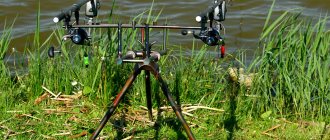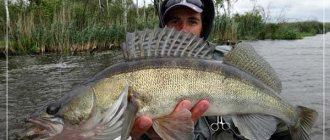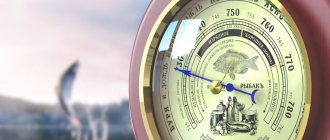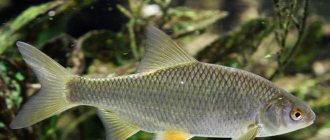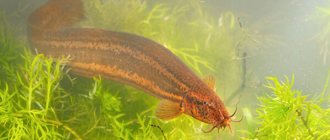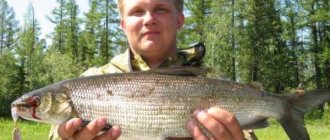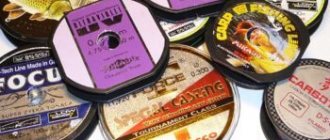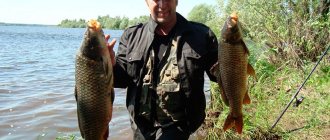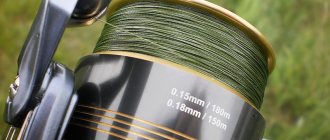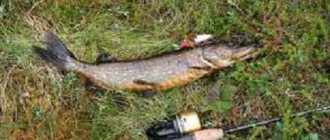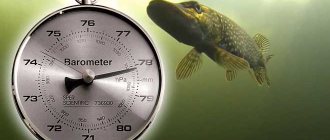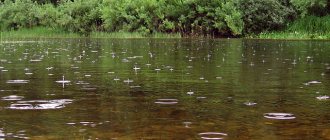Buy quality products at affordable prices in the best fishing online stores
. Give gifts to yourself and your loved ones!
we are in social networks
— subscribe to us on Facebook, Youtube, VKontakte and Instagram. Stay up to date with the latest site news.
Fishing is often unpredictable and brings many surprises. It often happens that in clear and warm calm weather the fish completely refuse to bite. And, conversely, in rainy and windy weather, effective bites follow one after another.
Experienced anglers know how weather can affect fish activity and bite. Moreover, almost every fisherman has his own signs, tested over many seasons. When going fishing and after arriving at a pond, many carefully observe changes in the weather, look at the barometer, and monitor the weather forecast.
In this article we will figure out which weather is favorable for fishing and which is not so good. We will focus on warm times, during periods of open water.
Good and bad weather for fishing
In the warm season, the best periods for fishing are cool days with a slight breeze and partly cloudy skies. If it rains during a summer day, then it will be wonderful.
After the rain, nature transforms before our eyes, the sun comes out and it becomes very fresh. It's nice to go outside and just take a walk. It is quite logical that the fish begin to bite more actively. Every angler knows that after a short summer rain, fishing becomes very productive and the fish tank is actively replenished with fish.
A good fish bite is observed during periods when the pressure is stable and not low. A very useful device for every fisherman is a barometer. You should pay attention to changes in pressure. If we see that the pressure has dropped sharply, then the weather is very likely to worsen. In this case, you should not count on a stable fish bite.
It’s good when the pressure is stable, normal or slightly elevated for several days. The main thing is a stable level, without sudden jumps. In summer, it even happens that with prolonged rains and low pressure, the fish begin to bite more actively over time. She adapts to this weather. And even if the pressure is low, the main thing is that it is stable, without jumps.
Barometric pressure can be viewed on weather websites. Some anglers have a barometer that hangs on the wall in their room. It can be used to predict weather changes. You can take with you small electronic barometers of this type:
They are especially useful for multi-day fishing trips.
If the pressure drops in warm weather, it means there is a cloudy cyclone with rain and cold temperatures. If the pressure rises, it means the weather will improve soon and the rains will stop.
It has been noticed that the fish bite well in light southern and southwestern winds. And vice versa, if a gusty north and northeast wind blows, the bite worsens. Only “local” and important places on a river or lake work.
In extreme heat, the fish bite is practically non-existent. Fishermen know well that in the middle of summer, when it is stuffy and very hot, it is better to fish at night, early in the morning and late in the evening. During these periods, the temperature drops a little and the street becomes more or less comfortable.
If during the day the sky becomes cloudy and the long-awaited coolness arrives, then fishing becomes more interesting, and there are more fish bites. In cloudy and warm weather, carp and, of course, pike are caught well.
The fish bite worse in warm weather with a constant north wind, when there are no periods of calm and the temperature drops sharply. At this time, it is better to stay at home, especially if you have little fishing experience. Experienced fishermen use even this time to their advantage. Yes, most likely they will only catch a couple of tails, but they will learn something useful for themselves. Maybe some previously unknown fact, or pattern, which will later come in handy on the next similar fishing trips. And in the end, it often happens that even on stormy days, when the rain pours heavily, there are small calm periods. The rain stops, the sky clears, it becomes quiet. In May, at this time, the crucian carp becomes active and takes the bait. In this way, nature rewards the fisherman for his patience and love of fishing.
A few words about weather forecasts on the Internet. Sometimes it seems that these forecasts are the result of someone’s fantasies. Be sure to check the weather from various sources, especially if you plan to fish overnight or for several days. Always look at the barometer and trust only trusted sites. Don't put too much faith in 1 week or 5 day forecasts. During this time, the forecast may change several times.
Experienced fishermen have learned to make their own weather forecasts. In this case, not only atmospheric pressure is taken into account, but also the behavior of animals, humidity, wind direction and its strength.
Atmosphere pressure
This natural phenomenon is most often mentioned by fishermen, justifying unsuccessful fishing. Pressure affects the life of people and animals. Its sharp changes, decrease or increase, affect the behavior of all living beings.
Stable pressure is suitable for fishing, without jumps. This rarely happens in nature. The movement of air masses leads to fluctuations in atmospheric pressure. The fisherman needs to have a barometer to know what kind of fish is being caught at the moment. Predatory fish are well caught at low pressure. When it is high you can catch peaceful fish. With sudden changes in atmospheric pressure, the fish feels discomfort. At this time the bite is bad.
In any weather conditions, the angler will find fish that will bite. Some river inhabitants love heat and high pressure, others are caught in rain and cool weather. Nature always has good weather.
Signs of good weather
Over the years, different fishermen have accumulated many different signs that can be used to predict good weather. Among these are the following:
- If there is no wind at night, and in the morning there is dew and a slight easterly breeze rises, then the weather will be good and without precipitation;
- In the evening the sun is yellow, not red. The weather will be calm and cloudless in the morning;
- If small clouds are visible during the day and practically do not move, then the weather will not worsen and they will disappear in the evening;
- When the temperature during the day and night is radically different, the weather will remain good in the following days;
- Birds fly high, seagulls often land on the water, and mosquitoes gather in flocks, then the weather will be good;
- Bees begin to fly out early in the morning - this is a good sign of stable and favorable weather for fishing;
- If the fish often jumps out of the water during the day and the frogs behave quietly, then tomorrow the weather will be normal;
- In the evening, during the warm season, there is practically no wind and sounds are clearly audible from the opposite shore, and larks actively sing - this is a harbinger of good weather tomorrow
- If the sun at sunset and the moon when it appears in the sky have a slightly irregular shape, then in the morning the weather will be favorable for fishing.
In autumn, in September, summer signs still work. As October approaches, the temperature drops. But these days can be the most productive for spinners. Asp, pike and pike perch are especially well caught. The main thing is that there is no strong wind during the day, and let the weather be partly cloudy. A good sign at this time is a flying web. This is a sure sign of the coming Indian summer. Similar days are coming, during which small roach, bream, bream and even carp are successfully caught.
Naturally, these are not all the signs. There are many other sightings, particularly for ice fishing. But they require separate consideration and analysis.
Signs of bad weather
There are also many signs that can help predict inclement weather. Here are the main ones:
- If in warm weather the wind increases and becomes gusty, then there is a high probability of bad weather with rain;
- When during the day clear weather gives way to cloudy weather and the wind increases in the evening and does not stop at night, then in the morning the weather will most likely worsen;
- Atmospheric pressure drops sharply in the summer, which means waiting for a cyclone and rainy weather;
- If massive clouds move in from the west or south and the wind intensifies, becomes gusty and does not pass by night, then a cyclone should be expected in the coming days;
- Before a thunderstorm, the wind can often change direction and speed. In summer, after a thunderstorm, the weather often improves, and in autumn and early spring, the wind often increases and partly cloudy weather is observed;
- On summer days, the night temperature is practically the same as the day temperature, and the weather is windy. This is a harbinger of impending bad weather. The bite weakens at this time, it becomes stuffy and there may be persistent rain in the morning;
- If at sunset the sun is red and there are elongated clouds near it, then in the morning windy and changeable weather is most likely expected. A good bite in such cases is not guaranteed;
- On a summer morning there is no dew, which means the weather may worsen during the day;
- If it is very hot during the day and stuffy in the evening and at night, then the next day you should expect the weather to worsen;
- If in the summertime worms are actively crawling out of the ground and there are a lot of leeches on the shore, toads are moving away from the reservoir, swallows are hovering low above the ground, mosquitoes sting strongly, then with a high probability we can expect worsening weather with prolonged rains.
- If the coals in the fire are very bright, then bad weather can be expected in the morning;
- The cry of crows does not promise good weather in autumn and summer;
- If in summer cirrus clouds appear in the sky, which gradually gather into one whole, and the speed of their movement increases, then you should expect rainy weather. With such phenomena, the pressure drops, and at night it is practically not cold;
- The bees do not want to fly out or fly, but not so actively, the frogs croak loudly, and the salt and tobacco become damp, then the morning will be rainy.
These signs do not always mean that the bite will be bad. In the hot summer months, sometimes rain and a decrease in temperature, on the contrary, lead to an improvement in the bite. It is especially pleasant to fish when there is a monotonous light rain, it becomes quite fresh, and there is no stuffiness. On such days, you can be content with rare outings of the sun, but you can successfully catch, for example, bream with a Bolognese fishing rod along the coastal dump.
Precipitation: the effect of rain on fish biting
Rain also has a significant impact on fish activity. Many anglers have heard that when it rains, the fish bite improves. But everything is not so simple.
In the hot season , when the water is well warmed up, rain really helps the fish come to their senses. It cools the hot water a little and saturates it with oxygen. The fish becomes lighter and begins to feed more actively. Sometimes cool rain on a hot day even leads to active feeding of fish.
Even a little drizzling rain can activate passive fish, especially such weather has a good effect on the bite of predators - pike, perch, pike perch. But this is if it rains on hot days.
At a comfortable water temperature , light rain most often activates the fish and its bite improves. Only if it's just regular summer rain. Abnormal weather in the form of heavy winds, rain and hail will not be a positive thing for the fish. And few people will be able to fish in such conditions.
If the weather is frankly cold , then the rain will force the fish to give up searching for food. The fish now need sun and warmth, not rain. Another point is that prolonged rain is usually accompanied by a sharp drop in atmospheric pressure, which entails a deterioration in fish bite. But a little drizzling or pouring rain on a hot sunny day practically guarantees a good bite.
Signs of ongoing and ending bad weather
In warm weather, the sky is filled with low clouds. This "gray ceiling" means rainy weather will continue over the next few days. But if such weather lasts for several days and the pressure is at the same level, then the fish can bite and catch well.
If the clouds move quickly and the wind is quite strong and gusty, and during rains there are bubbles in the puddles, then the weather will not improve quickly. It is better not to go fishing at this time.
During heavy rain it becomes stuffy and steamy, the sun is outside, which means the bad weather will continue and by the evening it will rain again.
In summer, during bad weather, the rain often intensifies, the clouds turn dark blue, and the wind changes directions. It is likely that by the evening the rain will stop, the clouds will go away, and the sky will become clear. At this time, the bite often improves, the pressure gradually rises, and good fishing is possible. In general, in summer the rain with large drops ends quickly and after it the sun quickly comes out, and it becomes nice outside, fish begin to be caught.
If it rains a little in the morning, then you should expect good weather during the day.
Changes in transparency and water level
Features such as transparency and water level directly depend on weather conditions, primarily precipitation. Long rains are quite capable of causing a pronounced rise in water levels, as well as melting snow, which usually has a positive effect on fish activity. Not least of all, this revival is due to the fact that both rain and snow melting bring aquatic inhabitants the appearance of a large amount of food washed from the shores.
Typically, such a rise in the water level is accompanied by a decrease in its transparency, which, on the one hand, makes it somewhat difficult to catch predatory fish, which also rely on vision, and on the other hand, dulls the vigilance of peaceful fish - in muddy water, much rougher equipment options can be used than in muddy water. transparent.
But a decrease in water level, especially a fairly rapid one, has a negative effect on fish activity. In this case, the inhabitants of the reservoir practically stop feeding and begin to look for deeper places.
What should an angler do during periods of bad weather?
If the weather forecast before fishing is not very good, this does not mean that you need to stay at home. In May, for example, it can rain every other day. But at the same time, the fish bite is often very good. In such situations, it is necessary to take raincoats, a tent, an awning, and large umbrellas that are inserted into the ground.
If you are driving, then park the car in a place from which you can leave during the rains. In summer, the soil dries out quite quickly, so there should be no problems during short rains. But if it rains for more than a day, then you shouldn’t go to places with primers by car.
You should check the integrity of the tent once again. If it is worn out, then it is better to take a film to cover the tent for insurance. During prolonged rain, the film will save your tent from getting wet. Install it on a level surface so that it is taut and drops quickly flow to the ground.
During a thunderstorm, you should not risk your health. It is better to stop fishing and wait out the bad weather in a car, tent or other secluded place away from the river. A body of water is a good conductor. It is dangerous to be near it during a thunderstorm. Such fishing may be the last event in your life.
It is very important to have a change of clothes, food and kitchen utensils, as well as a supply of dry firewood. When the rain stops, it will be nice to sit by the fire in different clothes and leisurely eat aromatic fish soup, baked potatoes with meat or fish.
